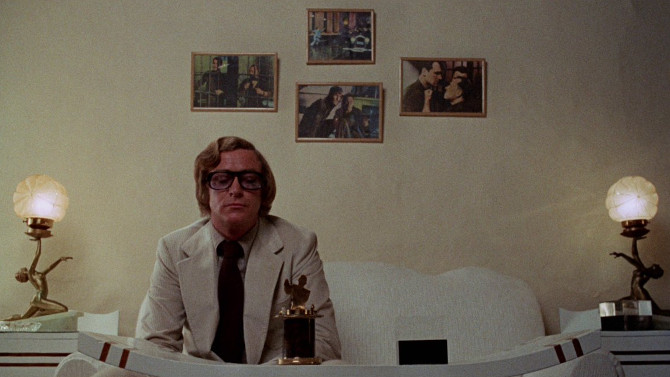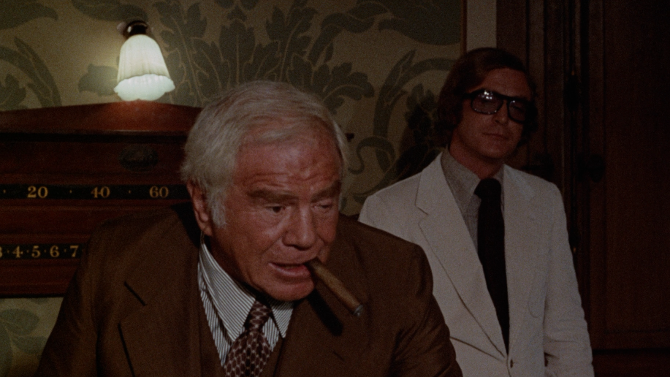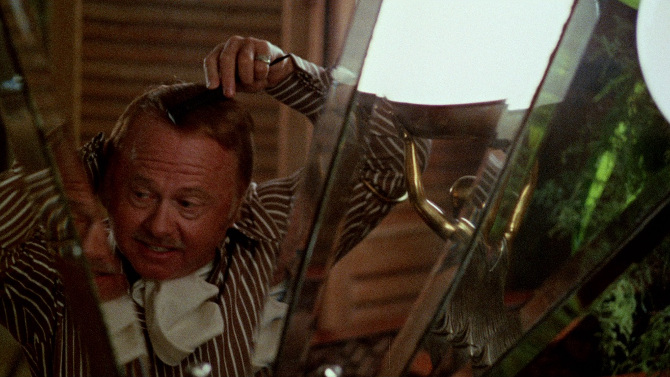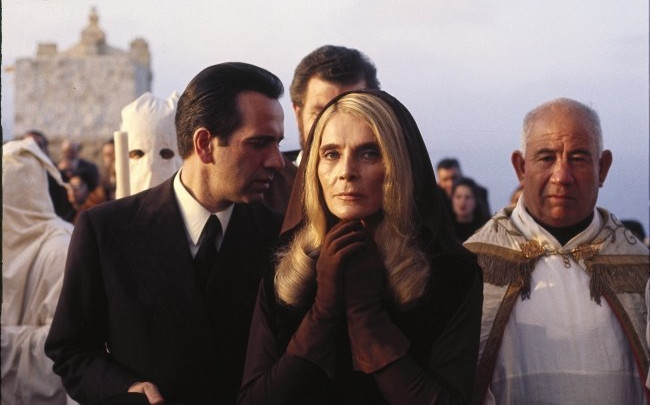Just a year after making one of the greatest crime pictures ever to come out of the United Kingdom – 1971’s Get Carter, the film’s three Michaels, producer Michael Klinger, writer/director Mike Hodges, and star Michael Caine reunited for a rather eccentric mishmash of genres and ideas – Pulp.
Bringing together an all-star team of creative minds, on top of the above mentioned Michaels, the film is edited by iconic director of five James Bond flicks John Glen (his first, 1981’s For Your Eyes Only, his last, 1989’s Licence to Kill), cinematographer Ousama Rawi (perhaps best known for his excellent television work on shows like The Tudors and Borgia), while the music was composed by famed Beatles’ producer George Martin (often nicknamed the fifth Beatle).
Combining a number of different comedic avenues (from dry to slapstick), with a dramatic crime story, Pulp is a neo-noir that follows a disreputable pulp fiction writer (and our voice over narrator throughout the story) named Mickey King (Michael Caine – a shaggier, less rough around the edges and rather more twitchy persona than the year earlier’s Carter) – Mickey Spillane he is not, who, while living in Rome, is approached by a hard-boiled celebrity manager/handler, Ben Dinuccio (Lionel Stander – who was Blacklisted during the House Un-American Activities Committee communist investigations) – as to who the celebrity is, he will not say. . . only that the aging man is looking for the writer to put together a rich telling of his life’s story (but, as a ghostwriter – much like all of his other work).
Living on a private, remote island (actually Malta, where the entire movie was shot), Mickey takes the unorthodox gig, hopping on a bus that will eventually take him to a ferry that will ship him off to the unknown man’s locale. Supposedly meeting an anonymous contact, Mickey assumes a so-called English professor named Miller (Al Lettieri) is the man, especially after a mix up has them exchanging hotel rooms. . . yet Mickey finds the guy dead in the room soon after – murdered (could that treatment have been meant for him?).
Eventually meeting with the unknown man’s mistress, Liz (Nadia Cassini), she and Dinuccio bring Mickey to meet Preston Gilbert (Mickey Rooney) – a famously small in stature actor who thrived playing gangster roles. . . while his personal life leaned a little too close to his onscreen personas. Run out of America for his ties with the mafia, he is looking to cement his legacy with a tell-all book before dying. Yet, Mickey has had a private eye tailing him for some time, while Gilbert has a checkered past, and rumblings suggest that hits may be out for both the writer and the actor – as some people may not want buried stories made public. With an unusual ending, a major occurrence changes the narrative’s pace about three quarters of the way through, a different take on the traditional cynical pictures of the 1940s and 50s – a late revealed mystery leading things down another path.
With some stellar performances, as always, Michael Caine just draws you in, a true movie star. Narrating the tale with lines like, “the day started quietly enough. . . then, I got out of bed. That was my first mistake. . . [and] that is how it all began, that bizarre adventure, which put five people in the cemetery and ruled me out as a customer for laxatives”, his deadpan character is the type of guy who has nom de plumes like S. Odomy, and writes stories with outlandish titles – ‘The Organ Grinder’ and ‘My Gun Is Long’ are just two. Investigating the unusual predicament he finds himself in, he is not your typical hardened detective, rather, a fleet-footed fella. Matched by some veteran actors, Mickey Rooney’s Gilbert is an absolute hoot; a conceited, looks obsessed, Napoleon complex former star – who expects everyone to sit when meeting him (and has multiple mirrored closet doors just so he can look at himself). . . many of the story’s best moments are when he is onscreen. Another absolute treat is seeing Lizabeth Scott again. The famed film noir starlet, she had not made a movie in fifteen years (and was nervous making her return – though there was no reason to be) – and Pulp ended up being her last picture. Playing Gilbert’s third of five wives (and now married to a prince), she still radiates. Lastly, Stander also deserves mention – a good-hearted manager who is a bit of a moocher, like his boss, he is a larger than life character.
A quirky film that plays off of traditional film noirs (famous Humphrey Bogart lookalike Robert Sacchi plays The Bogeyman – get it, and while at an event, approaches a Peter Lorre type at a party, asking him about a bird sitting on a perch – of course, it is a Maltese Falcon), it never truly succeeds in matching the magic Get Carter brought forth the year earlier, but there is still a lot to love. With an earthy colour tone that matches the Malta setting, it fits nicely into the quagmire Mickey finds himself in. Also, there is perhaps more slapstick style car humour than in any other movie, while some of the writing is quite funny (though some jokes do fall flat). And, George Martin’s score is equally impressive – a jaunty, laconic, playful tune that is in on all of the fun. Lastly, I must also mention its unique trailer, narrated by Stander in a Hitchcockian type of way (by Hodges’ own admission). So join this practical joke that followed Get Carter, you might just realize you should take it seriously.




